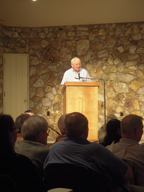In the final lecture of the Calvin Jubilee here, Joseph Small, director of Theology Worship and Education, discussed the definition of the word “church” — or the lack thereof.
In his speech, “Calvin and the Shape of the Church,” Small said that there isn’t a cohesive definition of the word and that the variety of mainline, emerging and mega-churches can be confusing and lead to fragmentation.
“What we mean when we use the word ‘church’ is important,” he said.
The Calvin Jubilee, July 8-11, was a celebration of Reformed leader John Calvin’s 500th birthday.
Calvin referred to the church as “mother” — one that nourishes, feeds and protects, Small said, adding that the church is central in all of Calvin’s writings.
Small focused on three aspects of Calvin’s thoughts on the church that remain relevant today: word and sacrament as central marks of the church, a unified plural ministry of clergy and laity and the communion of congregations.
The church comes into being with the real, living Christ in sacraments and word, Small said. Baptism, communion and proclamations are important.
“Where we see faithful proclamation and sacramental life, we see the church,” he said.
To Calvin, the word and sacrament were so central that any church that includes them must be embraced, regardless of its faults.
Sacraments and the word serve the same office of the word of God, Small said. Both offer Christ to us and show the real presence of the living Christ, uniting us to him through the Holy Spirit. The disciplines aren’t important in themselves, but because they prepare a community to accept Christ.
Calvin’s views on the word and sacrament aren’t boundaries, but should be seen more like directional markers, Small said. Calvin’s goal wasn’t to look at others with judgment, but to look inward at ourselves and our church.
“Do we see at the center of its life, proclamation of the gospel?” Small said.
In the Presbyterian Church (U.S.A), pastors are called ministers of the word and sacrament, but this aspect is too often overlooked by pastors who can become overwhelmed with administrative duties, Small said.
nother problem is that sometimes when pastors do the word and sacrament, they make themselves the center of the process, making the congregation mere receivers of religious goods and services, he said.
Small also questioned why the PC(USA) seems to focus more on the word than the sacrament; communion is generally taken one Sunday a month.
“A church of the word alone is in danger of becoming a church of words alone,” he said.
In the area of unified plural ministry, Small said that ministry is vital to the revival and maintenance of church life. For Calvin, ministry wasn’t confined to pastors. He considered pastors, teachers, elders and deacons “plural expressions of the church’s one undividedness,” Small said.
Deacons were intended to lead the church in caring for the needy, but many congregations no longer have deacons, Small said.
Pastors were originally called “teaching elders,” and elders were originally called “ruling elders.” The loss of these titles has also de-emphasized the intended roles, Small said. Now, elders often act like a board of directors, and pastors often play the role of administrators, he said.
Small then moved on to the communion of congregations.
The congregation is the basic form of the church, but it isn’t enough, he said. Congregations can’t stand alone, and the church can’t rely on invisible unity.
“There is one body of Christ,” he said, adding that communion can occur across space and through time.
“The division of the church was not a reality (Calvin) was willing to accept,” Small said.

